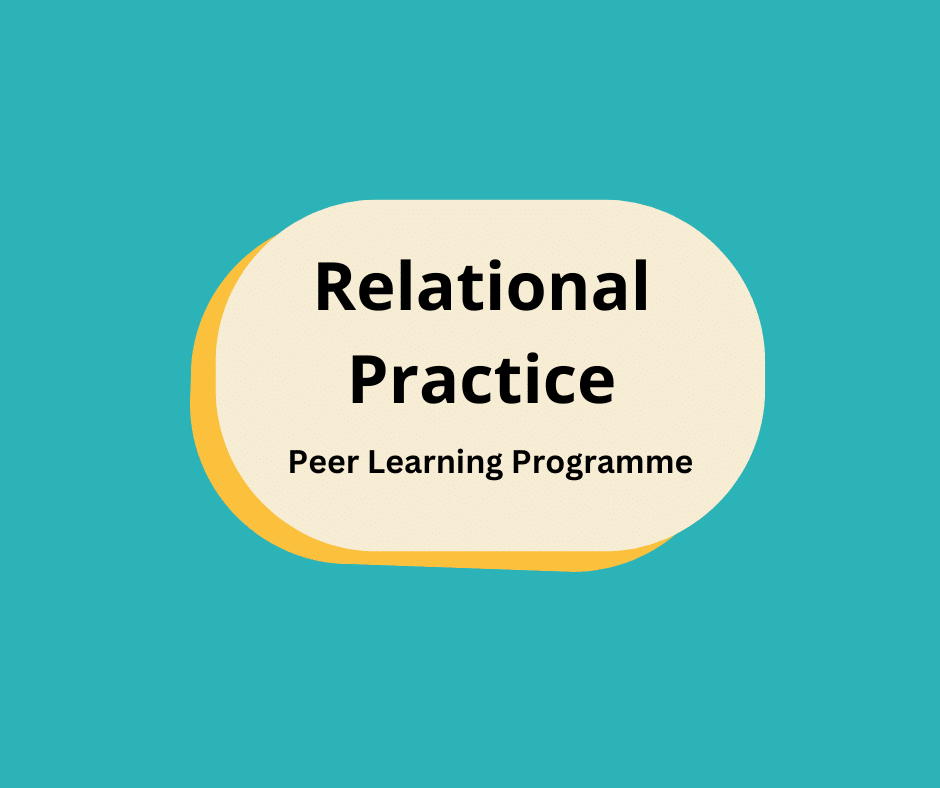Information and Overview
27th June 2023: The theme for the third session of the Relational Practice Peer Learning Programme was “Love in Professional Practice”. The session started with a brainstorm on “what does love mean to you”, which we represented as a word cloud:

After reflection in small groups about the progress of the projects being worked on, we heard some contributions and quotes about love, and how it could show up in professional practice. You can find them at the end of this article.
In the most powerful part of the session, we heard from a young care-experienced adult about his experience of love in professional practice. He had been in prison and believed that no-one cared about him. His PA was the only connection to the outside world, and would write to him regularly, asking what he was interested in, and sending photos and information about his interests. The young person said that he had tried to push the PA away – so that he could confirm his belief that no-one cared for him, but the PA had kept coming back. The PA had sent a birthday card – the only one he received – and he would never be able to explain how much the sound of that card being pushed through the door meant to him. He said that he wanted the professionals in the peer learning programme to stop talking about pathway plans and start to get to know the young people they worked with. Start to ask about their interests, what they celebrate – make it unconditional, not about the questions that they feel they have to ask. Listen to the young person talk about how they are and what’s on their mind – a conversation rather than a meeting with an agenda.
Complementing the perspective of the young person, we also heard from Rosie Blackett from the National House Project participation team, about how she thought about love in her work. Her starting point was “we all know what it is like to be human” and she would start by holding the young person in mind and getting to know them – and only then to consider what actions to take to support them. Her role had both formal aspects – such as a safety planning meeting, and informal aspects – such as sending a card to a new home, or smiling across the room at a young people’s event. A young person had described her approach as a professional friendship.
After some time to reflect, we introduced the 3 Ps model as a way to think about the professional, personal and private self in work with children and young people. Building authentic relationships with young people is critical to the work, because they need to know that they can trust their worker. But it can often cause challenges for professionals about what it means to be professional and to what extent we are able to be personal. The 3 Ps model, developed by Danish Social Pedagogues, helps us understand that we can’t be professional without being personal, so we have to be both. What we must avoid is not the personal but the private self – those parts of us that should rightly remain private.
Reflections
The session finished with reflections in small groups about what we’d heard on the day, and action planning on how to put some of what we’d heard into practice. Reflections from the day included:
- We don’t really talk about love – it can sound weird that a social worker “loves someone”. How can we have more of a debate about what love means in professional practice? What would need to happen for it to sound positive that a social worker “loves” a young person they support?
- Making time to see young person with no agenda is really hard. Given that we know from young people just how much it means to them and how powerful it is, how can we make it possible?
- The importance of keeping going if the young person does not respond – just keep going and help them realise that they’re worthy of love.
- Rosie’s feedback about her experiences was really helpful to our discussion – how can the concept of “holding someone in mind” help us in our work?
- 3 Ps is a model can easily flex and can be used for group and personal reflection – it enables us to navigate boundaries without a one-size-fits-all approach.
- Being human is so important – and being yourself.
Love in Professional Practice – some quotes to think about
- ‘Love is generous and kind; forgiving and understanding. But it is also demanding and ambitious. It does not seek a reward but it does set high expectations. Making good on such a commitment, however, means taking the time to get to know someone – their full story, not just their presenting symptoms – and seeing the person ‘in the round’, not merely the case or the condition. That requires building trust, because many of the people who engage with these solutions feel vulnerable and isolated. They have to be prepared to open up the defensive crust they have formed over themselves to expose what lies beneath, which is often a mixture of extreme fragility, unspoken aspirations and hidden strengths.’ (Leadbeater, 2020, p.10)
- ‘One of the great problems of history is that the concepts of love and power have usually been contrasted as opposites – polar opposites – so that love is identified with a resignation of power, and power with a denial of love … We’ve got to get this thing right. What is needed is a realisation that power without love is reckless and abusive, and love without power is sentimental and anaemic. Power at its best is love implementing the demands of justice, and justice at its best is power correcting everything that stands against love.’ Martin Luther King, Jr. August 16, 1967 “Where Do We Go From Here?”
- Vincent (2016) suggests that ‘Love is not simply an emotion or idea; it is not a passive engagement. Love is active and intentional, and it is communicated through behaviours as well as words. […] Love is not simply present, it is “embodied and performative … brought into existence by doing” (Lanas & Zembylas, 2014, p. 36)’.
- Looking across these studies, it can be seen that a ‘care system’ with love at its heart would include the following actions, attitudes and behaviours:
- Offer social support (including trust, guidance and accountability)
- Provide those ‘little extras’ which can make all the difference (a hug, a warm smile, a bit of extra time)
- Enable and encourage staff to get emotionally involved with the children in its care
- Put the child or young person at the centre of its work
- Allow physical contact and touch between carers and children
- Create a sense of belonging
- Ban the use of physical restraint
By contrast a ‘care system’ which did not have love at its heart would include the following actions, attitudes and behaviors:
- Withhold information from children and not tell them what was happening and why
- Focus on the bureaucracy and paper work of the ‘care system’
- Create an environment which did not make children feel safe or that they belong
- Allow relationships to be disrupted and fragmented
- Prevent the children in its care from forming a positive identity
Source: Waterton, Baker & Griesbach, 2019.
Additional Resources:
Scottish Care Review Evidence Framework – ‘Love – A review of the evidence of what promotes a loving environment for children and young people in and beyond care’
Joint special issue of the International Journal of Social Pedagogy and the Scottish Journal for Residential Child Care – Love in Professional Practice
Report by Charles Leadbeater for The Australian Centre for Social Innovation – When love meets power
Camden’s Relational Activism ‘Love Shows Up’- https://www.relationalactivism.com/love-shows-up-iv
The 3 Ps – The Professional, Personal and Private Self
The National House Project –An Evaluation of the National House Project’s Psychological Framework of Practice
Relational Practice: Session Two Resources
